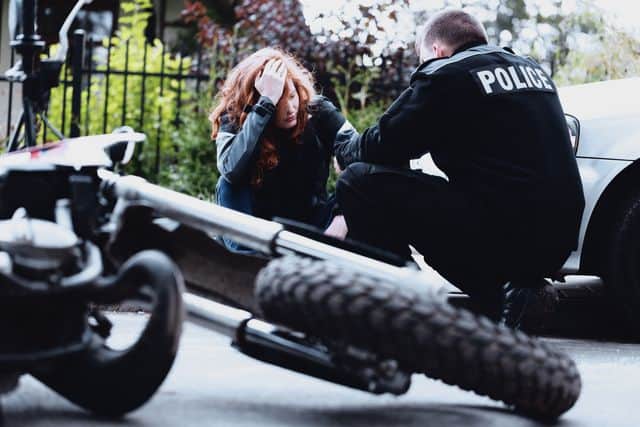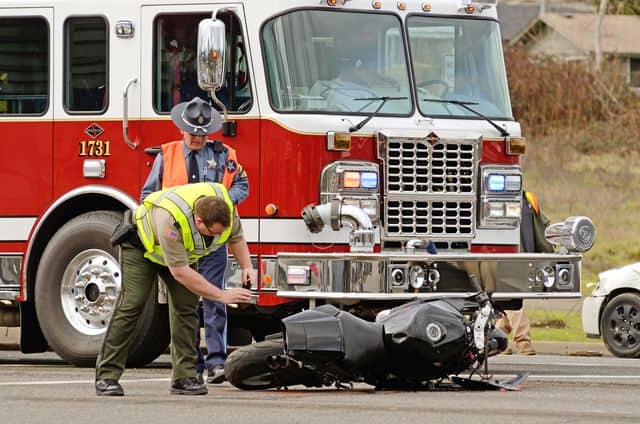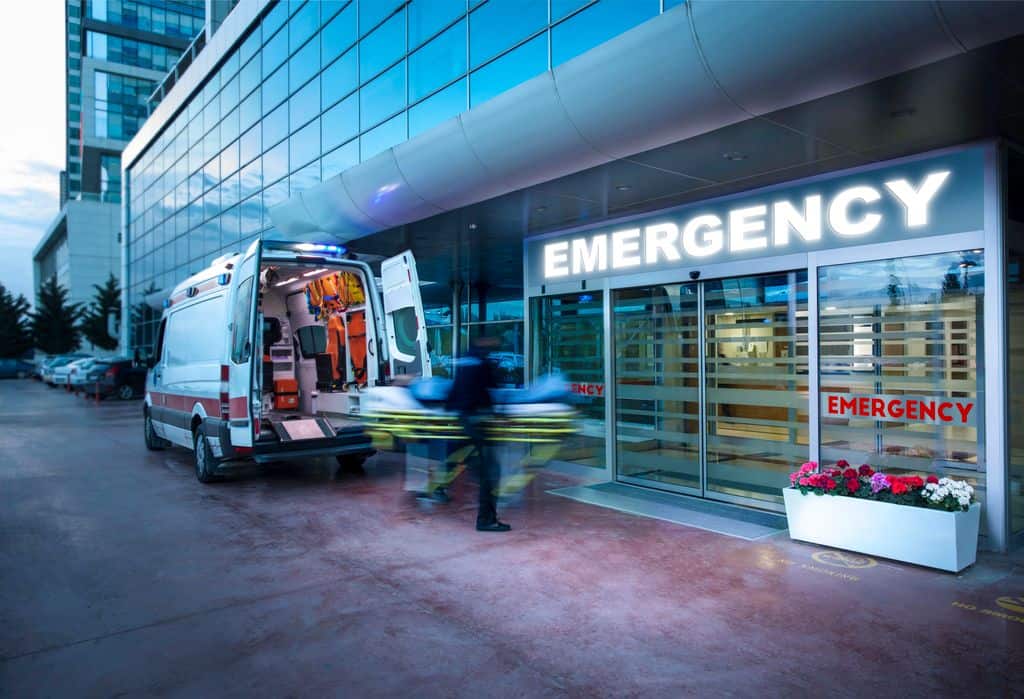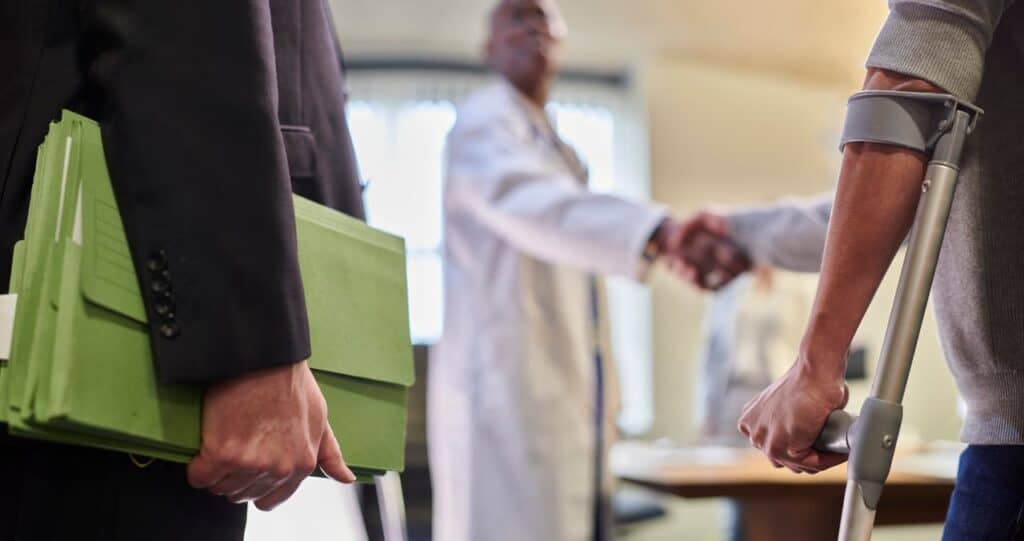Steps To Take After A Motorcycle Accident in Indiana
Experiencing a motorcycle accident can be both traumatic and disorienting, leaving you unsure of the next steps to take. Ensuring your safety and addressing legal and medical concerns are paramount. This guide is designed to help you navigate the aftermath of a motorcycle accident, providing you with essential advice on how to protect your rights and secure the support you need during recovery. Whether you’re dealing with minor injuries or facing more serious consequences, knowing the right actions to take can make a significant difference in the outcome of your situation.
The motorcycle accident lawyers at Doehrman Buba Ring are here to fight for your rights. We have years of experience representing injured motorcyclists and are dedicated to providing compassionate and effective legal support during this challenging time. If you’ve been injured in a motorcycle accident, reach out to us for a free consultation today.

Steps To Take After A Motorcycle Accident in Indiana
- Ensure Everyone is Safe
- Call Emergency Services
- Exchange Information
- Document the Accident
- Seek Medical Attention
- DO NOT ADMIT FAULT
- Notify Your Insurance Company
- Contact a Motorcycle Accident Lawyer
Ensure Everyone is Safe
The immediate aftermath of a motorcycle accident can be chaotic and frightening, but your first priority should always be to ensure the safety of everyone involved. If you can, move to a safe location off the road to avoid the risk of further collisions or injuries. This step is crucial not only for your safety but also for the safety of other motorists and emergency responders.
Move to a Safe Location: If possible and safe, move yourself and your motorcycle to the side of the road. This action prevents additional accidents and ensures a clear path for emergency vehicles. However, if moving might cause further injury or if the motorcycle is too damaged, it’s best to leave it and focus on getting yourself and others to safety.
Check for Injuries: Motorcycle riders should assess themselves and others for injuries. Even if the injuries seem minor, remember that adrenaline can mask pain immediately after an accident. Encourage anyone involved not to make sudden movements, especially if they suspect any spinal or significant injuries.
Call 911: Regardless of the accident’s severity, it’s vital to call 911. This ensures that anyone injured receives medical attention and results in an official police report, which can be invaluable for your insurance claim. Inform the dispatcher about the location, the number of people involved, and the nature of any injuries. This helps them send the appropriate response units to the scene.

Taking these steps prioritizes the well-being of everyone involved and plays a significant role in protecting your legal and insurance interests. Moving to a safe location can prevent further accidents, checking for injuries ensures timely medical care, and calling 911 creates an official record of the event. These actions can significantly impact the effectiveness of your insurance claim or any legal action you might need to take. It’s about safeguarding your health and your rights from the moment the accident occurs.
Exchange Information
After ensuring everyone’s safety and seeking medical attention as necessary, the next critical step is to exchange information with the other party involved in the accident. This should include:
- the driver’s name,
- contact information,
- insurance company and policy number,
- driver’s license number,
- and the license plate number of the vehicles involved.
If there are witnesses to the accident, try to get their contact information as well; their accounts could be invaluable in substantiating your claim.
Exchanging information is a fundamental step in protecting your rights and supporting your insurance claim or any potential legal action. The information gathered at the scene serves as key evidence, making it possible to accurately determine fault and liability. It ensures that you have the necessary details to file a thorough insurance claim, facilitating a smoother claim process. Additionally, in cases where the other party may be at fault, having detailed information bolsters your legal team’s ability to advocate for your rights and secure the compensation you deserve. Failing to collect this information can lead to challenges in proving your case and might potentially jeopardize your claim.
Document the Accident
Once you’ve ensured the safety of all parties and exchanged information, the next step is to meticulously document the accident scene. This involves taking comprehensive notes and photographs of the accident site, the damage to your motorcycle, any other vehicles involved, and any visible injuries you or others have sustained.
Take Photographs: Use your smartphone or a camera to take clear pictures from various angles, capturing:
- the overall scene of the accident,
- street signs or landmarks that can help identify the location,
- skid marks, road conditions,
- and traffic signals or signs nearby.
Make Notes: While the details are fresh, write down or record a voice memo detailing your recollection of how the accident occurred. Include the time of day, the weather conditions, any actions you recall taking to avoid the accident, and the behavior of the other driver(s) before the collision.
Gather Witness Statements: If there were any witnesses to the accident, ask if they would be willing to provide a brief statement about what they saw. Make sure to note their names and contact information for future reference.
Documenting the accident as thoroughly as possible plays a crucial role in the strength of your insurance claim or legal case. It provides tangible evidence that can support your account of events, helps in the accurate assessment of damages, and can be instrumental in establishing fault and liability. It’s advisable to keep this information organized and readily accessible for when you file your insurance claim or consult with a legal representative.
Seek Medical Attention

After documenting the accident and ensuring that all immediate dangers have been managed, it’s crucial to seek medical attention as soon as possible. Even if you believe your injuries are minor, some symptoms may not present themselves until hours or even days after the accident. A thorough medical evaluation is essential to rule out any internal injuries or concussion that might not be immediately apparent. Medical treatment can prevent you from suffering a serious injury or developing chronic pain.
Visit a Healthcare Professional: Regardless of how minor you feel your injuries are, visit a healthcare provider as soon as you can. Explain that you’ve been involved in a motorcycle accident and describe any symptoms or discomfort you are experiencing. The medical record established during this visit can be vital for your insurance claim or any legal action you might need to take later on.
Follow-Up on Treatment: If you’re given a treatment plan or follow-up appointments, it’s critical that you adhere to them. Failing to follow medical advice can not only delay your recovery but also negatively impact any claims for compensation you might make. Insurers or opposing legal teams could argue that your injuries were not as severe as claimed or that you contributed to your condition by not following medical advice.
The importance of seeking medical attention cannot be overstressed. It ensures that any hidden injuries are identified and treated, supports your insurance claim or legal case by providing documented evidence of your injuries, and, importantly, places your health and well-being at the forefront following the traumatic experience of a motorcycle accident.
DO NOT ADMIT FAULT
In the aftermath of a motorcycle accident, emotions and adrenaline can run high, potentially leading you to unintentionally admit fault at the scene. It’s critical to remain cautious about what you say to anyone involved, including the other driver, witnesses, and especially insurance representatives. Any statements that could be interpreted as an admission of guilt can severely undermine your position in both your insurance claim and any potential legal proceedings.
Even apologizing out of courtesy can be misconstrued as an admission of liability. Therefore, it’s advisable to limit your communication to the necessary exchange of information and to speak only about the factual aspects of the incident. Always wait for a complete investigation to be conducted, as fault is often determined after a thorough analysis of all the evidence, including police reports, witness statements, and documentation of the accident scene.
If contacted by the other party’s insurance company, be mindful not to discuss fault or details of the accident until you have consulted with your insurance provider or a legal representative. Protecting your rights begins with being prudent about your statements and ensuring you do not inadvertently accept blame for an accident whose circumstances have yet to be fully evaluated.
Notify Your Insurance Company
After taking the necessary steps to ensure safety, exchange information, document the accident, and seek medical attention, the next crucial phase is notifying your insurance company about the incident. It’s vital to do this in a timely manner; however, exercise caution and vigilance during this process. Before providing any formal statements or detailed accounts of the accident to your insurance company or the other party’s insurer, consult with a legal professional. Legal advice can be invaluable in navigating the complexities of insurance claims and can protect you from inadvertently making statements that could undermine your claim.
Insurance companies, while often supportive, may employ tactics aimed at minimizing payouts. They might request a recorded statement or ask leading questions designed to elicit responses that could be used to attribute fault or downplay the severity of injuries. Therefore, when you notify your insurer, limit the initial communication to the basic facts—date, time, location of the accident, and vehicles involved. Refrain from discussing fault or details of injuries until you have spoken to a lawyer.
Seeking legal counsel before engaging extensively with insurance representatives ensures that you are fully aware of your rights and the best practices for securing fair compensation. It acts as a safeguard against the possibility of settlement offers that do not adequately cover your medical expenses, damages, or pain and suffering. Remember, the objective is to ensure that you receive the support necessary for a full recovery, both physically and financially.
Consult a Motorcycle Accident Lawyer

After dealing with the initial aftermath of a motorcycle accident, consulting with a specialized motorcycle accident attorney is an imperative next step. An attorney with experience in motorcycle accidents can offer invaluable advice on how to proceed with your insurance claim or potential legal action. They possess the knowledge and expertise required to navigate the often complex legal terrain of motorcycle accidents and are well-versed in the nuances of traffic laws and liability issues that are specific to motorcyclists.
Why Seek Legal Counsel?
- Expert Guidance: An attorney can evaluate the specifics of your case, advise on the likelihood of success, and guide you through the process of securing fair compensation.
- Negotiation Skills: Experienced in negotiation, attorneys can deal with insurance companies on your behalf, helping to ensure you receive a settlement that adequately covers your medical bills, loss of earnings, and other expenses.
- Legal Representation: Should your case go to court, having a skilled lawyer to represent your interests can significantly increase the chances of a favorable outcome.
- Stress Reduction: Handling the aftermath of an accident can be emotionally taxing. Entrusting your legal matters to a professional allows you to focus on your recovery.
Choosing the Right Personal Injury Lawyer:
Selecting an attorney who specializes in motorcycle accidents is crucial. Look for someone who has a proven track record in similar cases and comes highly recommended by previous clients. Initial consultations are typically free and provide a good opportunity to assess whether the lawyer is a good fit for your needs.
Remember, time is of the essence when it comes to legal matters related to accidents. You must puruse a claim within two years of the accident date in Indiana, so it is advisable to seek legal counsel as soon as possible after an accident. A knowledgeable motorcycle accident attorney will not only guide you through the process but will advocate for your right to fair and comprehensive compensation for the injuries and losses you have suffered.
How We Can Help with Pursuing a Motorcycle Accident Claim
When pursuing a motorcycle accident claim, expert legal assistance can dramatically increase your chances of securing the compensation you deserve. At Doehrman Buba Ring, our team specializes in motorcycle accident law, combining years of experience with a deep understanding of the legal landscape to advocate effectively on your behalf.
Why Choose Doehrman Buba Ring for Your Motorcycle Accident Claim?

Personalized Approach: Each case is unique, and we provide personalized legal strategies tailored to meet your specific needs and circumstances.
No Upfront Costs: We operate on a contingency fee basis, meaning you don’t pay unless we win your case. This allows you to focus on recovery without worrying about legal fees.
Aggressive Representation: Our team is committed to fighting for your rights, ensuring that insurance companies and opposing parties recognize the seriousness of your claim.
Comprehensive Support: From gathering evidence and negotiating settlements to representing you in court if necessary, we handle every aspect of your claim, allowing you to concentrate on your health and recovery.
Choosing to pursue your motorcycle accident claim with us means securing a partner who is as invested in your recovery and compensation as you are. Contact us today to schedule a free consultation, where we can discuss your case and how we can help achieve the best possible outcome.
Contact Our Indiana Motorcycle Accident Lawyers Today
If you or a loved one has been involved in a motorcycle accident, it’s essential to seek legal counsel as soon as possible. At Doehrman Buba Ring, our team of experienced Indiana motorcycle accident lawyers is here to provide the support and representation you need during this challenging time. Contact us today to schedule a free consultation and take the first step toward securing fair compensation for your injuries and losses.


